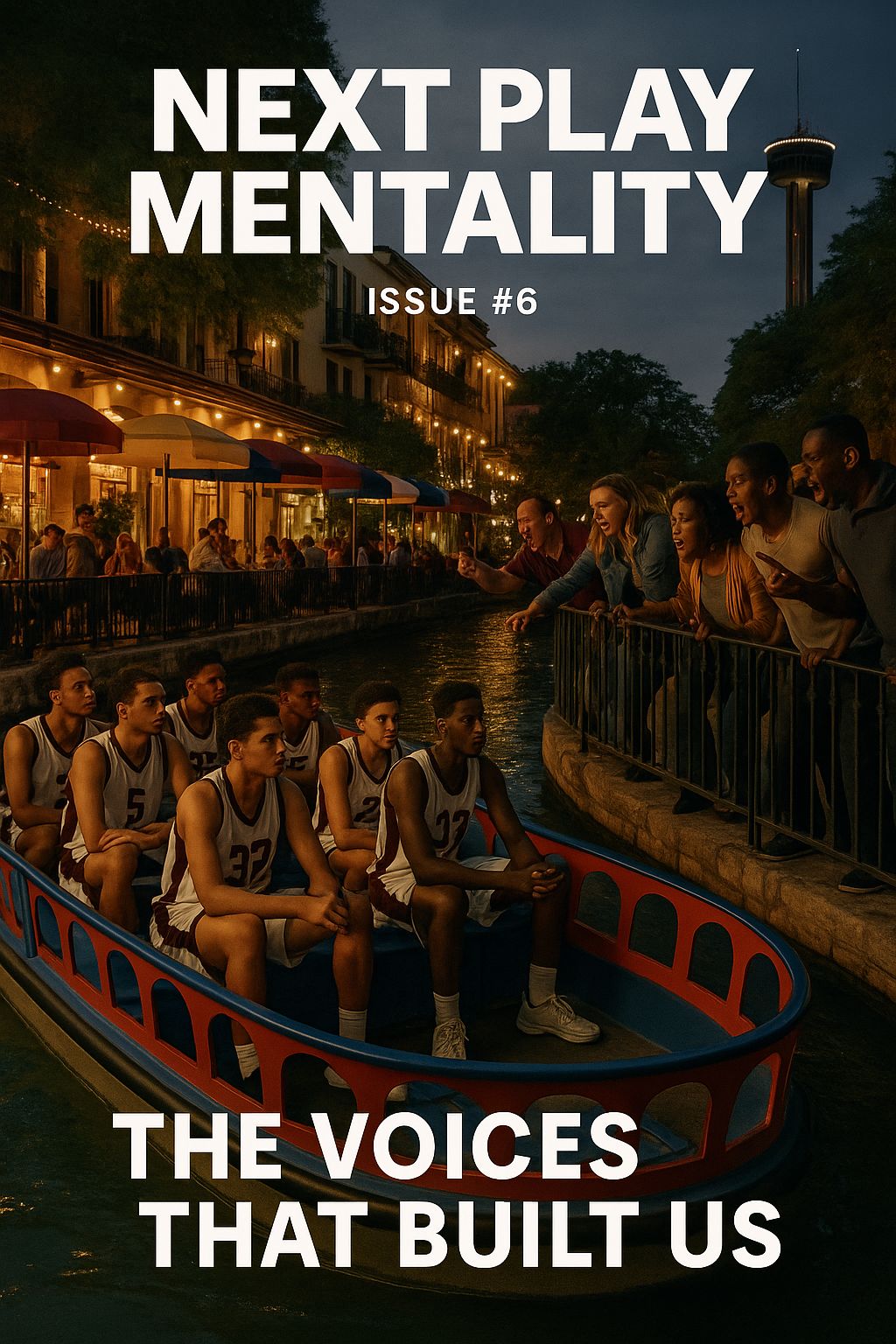- Next Play Mentality
- Posts
- Next Play Mentality
Next Play Mentality
Issue 6 THE VOICES THAT BUILT US

Next Play Mentality Newsletter – Issue No. 6
The Voices That Built Us
This culture wasn’t built by one person. It was shaped by shared experiences, personal growth, and real conversations—on and off the court.
Opening Message from Coach Jason:
This issue is different.
We’re handing the mic to the people who live this every day—players, parents, coaches.
The ones who show up. The ones who fall short and get back up.
The ones who’ve helped shape what this is.
And here’s my story:
This weekend, I wasn’t Coach—I was Dad.
Watching my high school son’s game, I felt like the referees were out of line. I voiced my frustration. But in doing that, I forgot what I teach. I let emotion lead.
Emotional intelligence isn’t about being perfect.
It’s about recognizing when you need to be better—and choosing to actually be better next time.
It’s a reminder to check ourselves before we check others.
This issue is full of moments like that—from all of us.
Real stories. Real feedback. Real voices.
Because culture isn’t what we say—it’s what we build together.
From Coach S:
“We are developing—raising—future athletes of the community. You’re damn right.”
That was her response to something I wrote in a previous issue:
“The mission isn’t mine alone. It’s ours.”
She followed it up with this:
Too many people in leadership make it about themselves. They don’t trust others to lead.
But if it’s really about the kids, it can’t be about control.
Trust matters.
You’ve got to leave personal baggage at the door and separate what you’re going through from what they need.
It’s not easy—but that’s how real culture is built.
From a Varsity Parent:
“At one point, I found myself pacing the sideline, more stressed than my son. Every missed shot, every sub, I was reacting. Until one day, he looked over—not for advice, but to see how I was reacting.”
That’s when it hit me: I was coaching him with my body language. Pressuring him.
I apologized. Told him I trust him. Told myself to act like it.
If I say I’m here for the kids, I’ve got to act like it.
From an Assistant Coach:
“There was a time I wanted more—more say, more spotlight, more control. I felt like I was ready, but I wasn’t being heard.”
One day, the head coach told me:
“You’re valuable—but you’re not listening.”
That wrecked me—but it changed me.
I started listening more. Supporting more. Speaking with intention.
Being an assistant doesn’t mean being silent—it means being in sync.
Now we move as one staff, one mission.
From a Player (8th Grade):
“Bro… sometimes it feels like the adults are more hyped than we are. One coach says ‘play loose,’ then gets mad when you mess up. Parents be yelling like it’s the championship—every game.”
It gets in your head. But I’m learning to block it out and just hoop.
When I feel trusted, I play free. That’s when it feels right.
From a Player (High School):
“Bro, real talk… it’s hard to focus when it feels like everyone’s watching to judge, not support. You miss a shot—somebody reacts. You come out—they shake their head.”
But I’ve learned to protect my peace. I focus on effort, attitude, next play.
We’re not just athletes. We’re people too. Trust us, coach us, and let us breathe. For real!
From a Varsity Assistant / JV Head Coach (Anonymous):
“There are moments in this role where you feel invisible. Like your input doesn’t matter. You’re left out of conversations, and you start to question if your voice even belongs.”
But he brought it back to the bigger picture:
“When there’s trust, coaches feel valued. When there’s conversation, new ideas come to life.”
It takes humility to lead—and even more to follow with purpose.
Even when it’s quiet, even when it feels like no one’s watching—keep building.
Because if it’s really about the kids, you stay locked in. And when your moment comes, you’re ready.
From a Coach (National Program):
“Too many times, we coaches point the finger—at parents, at players—when really, the culture starts with us.”
He didn’t hold back:
“Team culture starts with the head coach. Not all coaches are teachers. Not all are problem-solvers. And some flat-out avoid conflict.”
Because building culture isn’t just about running plays—it’s about facing what needs fixing.
And if coaches won’t lead with growth, the team never will.
Closing Message – Coach Jason Garcia
You just heard it from every angle—coaches, players, parents.
Different voices, same truth:
Culture doesn’t come from the top. It comes from alignment.
And alignment only happens when there’s trust.
When egos step aside.
When adults check themselves before correcting others.
When we all stop pointing fingers and start holding mirrors.
This newsletter isn’t about who’s right.
It’s about listening—to each other, to the kids, to what this moment needs from us.
We’ll get things wrong. I got it wrong just last week.
But the mission doesn’t change:
Raise the standard. Stay locked in. Build something real.
Next Up – Issue No. 7
Winning has its place. But when it becomes the only thing—we start losing the most important things.
Player growth. Teaching moments. Team culture. Real understanding of the game.
We’ll dive into that next.
Issue No. 7: What Should Never Be Lost in the Name of Winning
Let’s talk about overcrowded programs, poor teaching, and what happens when development takes a back seat to the scoreboard.
Until then, keep embracing the next play.
— Coach Jason Garcia